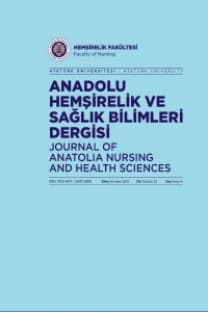HEMŞİRELİK ÖĞRENCİLERİNİN ÜSTBİLİŞ DÜZEYLERİNİN ÇEŞİTLİ DEĞİŞKENLER AÇISINDAN İNCELENMESİ
Biliş;; hemşirelik öğrencileri.
Cognition; nursing students.,
___
- Aktürk AO, Şahin İ. Üstbiliş ve Bilgisayar Öğretimi. Selçuk Üniversitesi Ahmet Keleşoğlu Eğitim Fakültesi Dergisi 2011;;31(2):383-407.
- Baltacı M, Akpınar B. WEB Tabanlı Öğretimin Öğrenenlerin Üstbiliş Farkındalık Düzeyine Etkisi. Mustafa Kemal Üniversitesi Sosyal Bilimler Enstitüsü Dergisi 2011;; 8(16): 319-33.
- Choi H. The Effects of Problem Based Learning on the Metacognition, Critical Thinking and Problem Solving Process of Nursing Students. Taehan Kanho Hakhoe Chi 2004; 34(5): 712-21.
- Demir Ö, Özmen Kaymak S. Üniversite Öğrencilerinin Üstbiliş Düzeylerinin Çeşitli Değişkenler Açısından İncelenmesi. Çanakkale Üniversitesi Sosyal Bilimler Enstitüsü Dergisi 2011;; 20(3): 145-60.
- Flavell J H. Metacognitive and Cognitive Monitoring: A New Area of Cognitive Developmental Inquiry. American Psychologyst 1979; 34(10): 906-11.
- Kuiper R. Enhancing metacognition through the reflective Use of self-regulated learning strategies 2002; 33(2): 78-87.
- Kuiper RA, Pesut DJ. Promoting Cognitive and Metacognitive Reflective Reasoning Skills in Nursing Practice: Self-regulated Learning Theory. Journal of Advanced Nursing 2004; 45(4): 381-91.
- Özsoy G. Üstbiliş. Türk Eğitim Bilimleri Dergisi 2008; 6(4): 713-40.
- Poorman S, Mastorovich M. Using Metacognitive Straregies to Help Students Learn in Pretest and Posttest Rewiev. Nurse Educator 2008; 33(4): 176
- Saban İflazoğlu A, Saban A. Sınıf Öğretmenliği Öğrencilerinin Bilişsel Farkındalıkları ile Güdülerinin Bazı Sosyo-Demografik Değişkenlere Göre İncelenmesi. Ege Eğitim Dergisi 2008;; 9(1): 35
- Semerci Ç, Elaldı Ş. Tıp Fakültesi Öğrencilerinin Üstbilişsel İnançları (Cumhuriyet Üniversitesi Örneği). Uluslararası Eğitim Programları ve Öğretim Çalışmaları Dergisi 2011;; 1(2): 37-49.
- Tosun A, Irak M. Üstbiliş Ölçeği-30’un Türkçe Uyarlaması, Geçerliği, Güvenirliği, Kaygı ve Obsesif-Kompülsif Belirtilerle İlişkisi. Türk Psikiyatri Dergisi 2008; 19(1): 67-80.
- Worrell PJ. Metacognition: Implications for Instruction in Nursing Education. J Nurs Educ 1990; 29(4): 170-5.
- ISSN: 1309-5471
- Yayın Aralığı: Yılda 4 Sayı
- Yayıncı: Atatürk Üniversitesi Hemşirelik Fakültesi
BASINÇ YARASI GELİŞİMİNDE PERFÜZYON DEĞERLERİNİN ETKİSİ
Elçin ÜLKER EFTELİ, Ülkü GÜNEŞ
DOĞUM EYLEMİNDE BEL AĞRISININ HAFİFLETİLMESİNDE İNTRADERMAL STERİL SU ENJEKSİYONU
ERGENLERİN SAĞLIKLI YAŞAM BİÇİMİ DAVRANIŞLARININ DEĞERLENDİRİLMESİ
Meltem KARADAMAR, Rana YİĞİT, Mehmet Ali SUNGUR
MEDYANIN KADIN ESTETİĞİ ÜZERİNE ETKİLERİ VE EBENİN ROLÜ
Evşen NAZİK, Gürsel ÖZTUNÇ, Berksoy ŞAHİN
YETİŞKİN SAĞLIK OKURYAZARLIĞI ÖLÇEĞİ’NİN GELİŞTİRİLMESİ
Evaluation of Healthy Lifestyle Behaviours in Adolescents
Meltem KARADAMAR, Mehmet Ali SUNGUR, Rana YİĞİT
HEMŞİRELERİN PROFESYONEL TUTUMLARI İLE BUNU ETKİLEYEN FAKTÖRLERİN İNCELENMESİ
Yurdanur DİKMEN, Melike YÖNDER, Songül YORGUN, Yasemin YILDIRIM USTA, Sema UMUR, Aynur AYTEKİN
GEÇERLİK VE GÜVENİRLİK ÇALIŞMALARINDA DOĞRULAYICI FAKTÖR ANALİZİNİN KULLANIMI
HEMŞİRELİK ÖĞRENCİLERİNİN ÜSTBİLİŞ DÜZEYLERİNİN ÇEŞİTLİ DEĞİŞKENLER AÇISINDAN İNCELENMESİ
